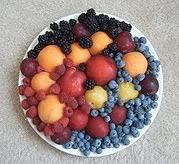
There is all sort of debate over the nature of "a healthy diet". What is it? The BBC recently reported that
Many Britons are unaware how to follow a healthy, balanced diet, the official food watchdog has said.(The full story is here)
Well while there may be some confusion, there is normally agreement that you need to eat lots of fruit and vegetables. Now I am not going to tell you not to eat your veggies....but it is interesting to try to find the evidence for the common prescriptions, e.g. to eat 5 portions of fruit and veg a day.
Barry Groves has an interesting article on this on this which I was reminded of after reading this new piece of research.
This study looked at people who had had polyps in the large bowel. They were put on the standard healthy diet - low in fat, high in fibre and lots of fruit and veg. It didn't make a difference to the recurrence of polyps.
I personally think that veggies are generally good things to eat, but they are not the panacea that they are sometimes portrayed to be. Natural (Animal) Fat and protein and the vitamins that go along with them are the essentials. I would also note that there are people out there with food intolerances who do not react well to most fruit and veg - the salicylate contents are too high. Check out Emma's blog for more on this.
There was a similar study to the one below that Barry Groves points to here.
This study showed that breast cancer survivors who ate substantially more than the recommended five servings a day did not have lower risk of recurrence or new primary breast cancer or lower risk of overall mortality) than those who ate only the recommended amount.
The high fruit and vegetable diet also showed no benefit among women who, you might expect, stood to gain the most – those with a baseline diet which was low in fruits and vegetables or high in fat.
The Polyp Prevention Trial Continued Follow-up Study: No Effect of a Low-Fat, High-Fiber, High-Fruit, and -Vegetable Diet on Adenoma Recurrence Eight Years after
The Polyp Prevention Trial (PPT) was a multicenter randomized clinical trial to evaluate the effects of a high-fiber (18 g/1,000 kcal), high-fruit and -vegetable (3.5 servings/1,000 kcal), and low-fat (20% of total energy) diet on the recurrence of adenomatous polyps in the large bowel over a period of 4 years. Although intervention participants reported a significantly reduced intake of dietary fat, and increased fiber, fruit, and vegetable intakes, their risk of recurrent adenomas was not significantly different from that of the controls. Since the PPT intervention lasted only 4 years, it is possible that participants need to be followed for a longer period of time before treatment differences in adenoma recurrence emerge, particularly if diet affects early events in the neoplastic process. The PPT-Continued Follow-up Study (PPT-CFS) was a post-intervention observation of PPT participants for an additional 4 years from the completion of the trial. Of the 1,905 PPT participants, 1,192 consented to participate in the PPT-CFS and confirmed colonoscopy reports were obtained on 801 participants. The mean time between the main trial end point colonoscopy and the first colonoscopy in the PPT-CFS was 3.94 years (intervention group) and 3.87 years (control group). The baseline characteristics of 405 intervention participants and 396 control participants in the PPT-CFS were quite similar. Even though the intervention group participants increased their fat intake and decreased their intakes of fiber, fruits, and vegetables during the PPT-CFS, they did not go back to their prerandomization baseline diet (P < 0.001 from paired t tests) and intake for each of the three dietary goals was still significantly different from that in the controls during the PPT-CFS (P < 0.001 from t tests). As the CFS participants are a subset of the people in the PPT study, the nonparticipants might not be missing completely at random. Therefore, a multiple imputation method was used to adjust for potential selection bias. The relative risk (95% confidence intervals) of recurrent adenoma in the intervention group compared with the control group was 0.98 (0.88-1.09). There were no significant intervention-control group differences in the relative risk for recurrence of an advanced adenoma (1.06; 0.81-1.39) or multiple adenomas (0.92; 0.77-1.10). We also used a multiple imputation method to examine the cumulative recurrence of adenomas through the end of the PPT-CFS: the intervention-control relative risk (95% confidence intervals) for any adenoma recurrence was 1.04 (0.98-1.09). This study failed to show any effect of a low-fat, high-fiber, high-fruit and -vegetable eating pattern on adenoma recurrence even with 8 years of follow-up. (Cancer Epidemiol Biomarkers Prev 2007;16(9):1745-52).

No comments:
Post a Comment